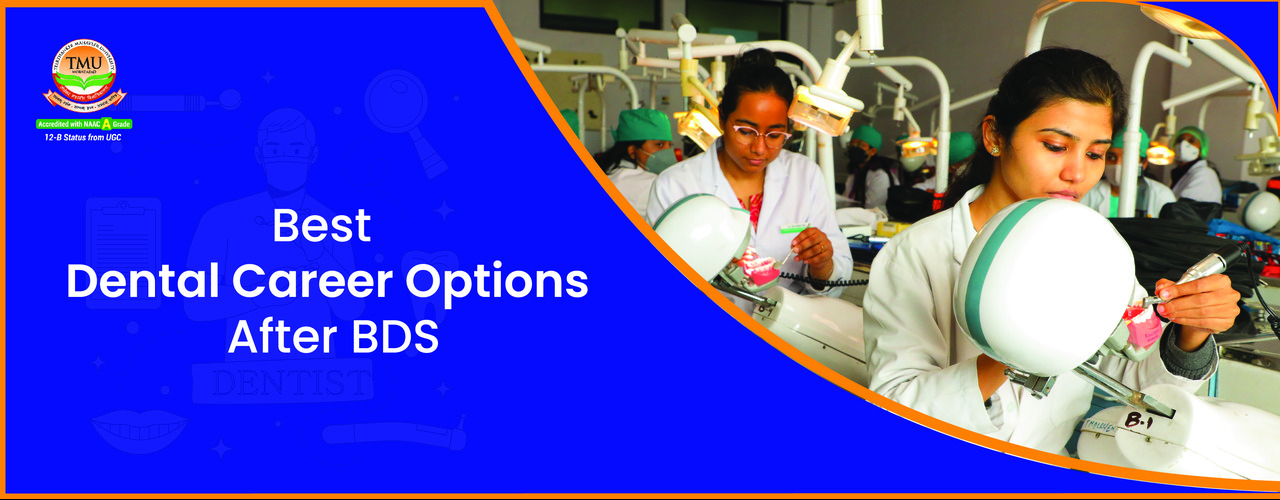11 Best Dental Career Options After BDS
Table of Contents
BDS stands for Bachelor of Dental Surgery, which is an undergraduate degree programme in the field of dentistry. A professional degree prepares students to become dental surgeons and practitioners.
To be eligible for the BDS Course, candidates must have completed their 10+2 education with core subjects including Physics, Chemistry, and Biology. In India, admission to BDS courses is primarily through the National Eligibility cum Entrance Test (NEET), which assesses the candidates' aptitude in the sciences. This rigorous selection process ensures that only the most dedicated students enter the field, which is vital given the critical role dental professionals play in healthcare.
Key Subjects in BDS:
- Oral Anatomy
- Oral Physiology
- Oral Pathology
- Dental Surgery
- Orthodontics
- Prosthodontics
- Periodontology
By pursuing BDS, you can become a qualified dentist and contribute to oral healthcare.
The Top 11 Dental Career Options After BDS
Here is the list of the most popular career paths you can explore after completing your BDS:
| Career Option | Description |
| Specialise in a specific dental field like orthodontics, periodontics, or oral surgery. |
| Share your knowledge with aspiring dentists by joining a dental college. |
| Work in government hospitals or public health departments. |
| Open your dental clinic. |
| Cater to international patients seeking dental treatments. |
| Serve the nation while pursuing a dental career. |
| Work in the dental industry promoting products and services. |
| Contribute to advancements in dental science. |
| Share dental knowledge through articles and publications. |
| Capture dental cases for documentation and marketing. |
| Create innovative tools for dental professionals. |
Teerthanker Mahaveer University
Apply for Admission
Click Here To Apply for Admission
Best Dental Careers After BDS
A BDS degree opens up a wide range of career paths. Let's explore some of the most popular options:
| Career Option | Description |
| Clinical Practice (Private Practice, Hospitals, Armed Forces) | Clinical Practice |
| Higher Studies (MDS, PhD) | Higher Studies |
| Teaching | Teaching |
| Research | Research |
| Public Health | Public Health |
| Dental Sales and Marketing | Dental Sales and Marketing |
| Forensic Odontology | Forensic Odontology |
Top Career Paths for BDS Graduates
BDS degrees open the door to a wide variety of careers. Careers in these areas include:
1. Clinical Practice
- General Dentistry: Many BDS graduates establish their practices or join clinics, offering a range of dental services.
- Specialisation: Postgraduate studies in orthodontics, periodontics, oral surgery, or prosthodontics can enhance expertise and earning potential.
2. Academic and Research Roles
- Teaching: Graduates can pursue teaching positions in dental colleges and universities, shaping future dental professionals.
- Research: Involvement in dental research allows professionals to contribute to scientific advancements and can be pursued in academic or private settings.
3. Hospital and Public Health Dentistry
- Hospital Dentistry: Working as a dental surgeon in hospitals provides exposure to complex cases and collaboration with other healthcare professionals.
- Public Health: Graduates can work in community health settings, promoting dental health and improving access to care.
4. Armed Forces and Government Services
- Dental Officer: The armed forces and government health departments offer roles for dental officers to provide care and manage public health initiatives.
5. Corporate Sector and Consultancy
- Dental Product Companies: Working with manufacturers to develop and market dental products.
6. Entrepreneurship
- Private Practice: Starting a private dental practice allows for personalised care and innovation.
- Dental Start-ups: Engaging in dental tech start-ups or product development offers unique business opportunities.
7. Writing and Journalism
- Medical Writing: Contributing to dental journals and educational content.
- Health Journalism: Writing articles and reports on dental health issues and advancements.
Advanced Studies After BDS
A BDS degree is a solid foundation, but many dentists opt for further specialisation to enhance their skills and career prospects. Here are the primary avenues for advanced studies:
Master of Dental Surgery (MDS)
This is the most common path, offering in-depth knowledge in specific dental domains. Popular specialisations include:
- Oral and Maxillofacial Surgery: Dealing with facial injuries, oral cancer, and reconstructive surgeries.
- Conservative Dentistry and Endodontics: Focusing on tooth preservation and root canal treatments.
- Periodontics: Specializing in gum disease prevention and treatment.
- Orthodontics: Correcting misaligned teeth and jaws.
- Prosthodontics: Replacing missing teeth with artificial ones.
- Public Health Dentistry: Concerned with oral health promotion and prevention on a community level.
- Oral Pathology: Diagnosing and studying oral diseases.
- Pediatric Dentistry: Caring for children's oral health.
Other Postgraduate Options
- Master of Science (MS) in Oral Biology: Delving deeper into dental research and scientific aspects.
- Master of Public Health (MPH): Focusing on public health initiatives related to oral health.
- Master of Business Administration (MBA): For those interested in dental practice management or healthcare administration.
- Fellowship Programs: Offered by various institutions, providing specialised training in specific areas.
Specialisations in Dentistry After BDS
Here are the primary specialisations available after completing a BDS degree:
| Specialisation | Description |
| Oral and Maxillofacial Surgery | Handles surgical procedures related to the mouth, jaws, and face. |
| Conservative Dentistry and Endodontics | Focuses on tooth preservation and root canal treatments. |
| Periodontics | Deals with gum diseases and their treatment. |
| Orthodontics | Corrects misaligned teeth and jaws. |
| Prosthodontics | Replaces missing teeth with artificial ones. |
| Public Health Dentistry | Provides dental care for children. |
| Oral Pathology | Diagnoses and studies oral diseases. |
| Pediatric Dentistry (Paedodontics) | Manages medical conditions affecting the oral cavity. |
| Oral Medicine and Radiology | Diagnose and treat oral conditions, while oral radiology uses imaging for diagnosis. |
Postgraduate Courses for Dental Students
Postgraduate studies in dentistry offer specialised knowledge and skills. Here are the primary options:
| Program Category | Specialisation/Description |
| Master of Dental Surgery (MDS) | In-depth knowledge of specific dental domains. |
| Other Postgraduate Options | Master of Science (MS) in Oral Biology |
| Non-Degree Options | Certificate Courses |
Other Postgraduate Options
- Master of Science (MS) in Oral Biology
- Master of Public Health (MPH)
- Master of Business Administration (MBA)
- Doctor of Philosophy (PhD): For research-oriented individuals.
- Fellowship Programs: Offered in various specialisations for advanced training.
Non-Clinical Career Options for Dentists
Dentists possess a unique blend of scientific knowledge and interpersonal skills, making them suitable for various non-clinical roles. Here are some options:
Industry and Research
- Dental Research: Contributing to advancements in dental science and technology.
- Pharmaceutical Industry: Working on dental product development and marketing.
- Medical Device Companies: Involved in research, development, and sales of dental equipment.
Business and Management
- Dental Practice Management: Managing dental clinics or chains.
- Healthcare Administration: Working in hospital or healthcare system management.
- Dental Equipment Sales and Marketing: Representing dental products and services.
- Dental Insurance: Roles in claims processing, underwriting, or policy development.
Other Options
- Dental Journalism and Writing: Creating dental content for publications or websites.
- Forensic Odontology: Applying dental expertise to legal investigations.
- Dental Education: Teaching and mentoring future dentists.
- Healthcare Consulting: Providing expertise in dental practice management or healthcare policy.
Conclusion
A BDS degree presents a diverse range of career opportunities, catering to various interests and aspirations. From direct patient care in private practice or hospitals to specialised roles in research, education, and administration, the dental field offers a dynamic and rewarding path.
Whether you are drawn to the intricacies of clinical practice, the challenges of research, or the strategic aspects of healthcare management, there is a suitable career option for every BDS graduate. By carefully considering personal interests, skills, and long-term goals, individuals can carve out a fulfilling and successful career in the dental profession.
Continuous learning and professional development are essential for staying updated with advancements in dental science and technology. Pursuing postgraduate studies or specialised certifications can further enhance career prospects and open doors to leadership positions within the dental industry.
Frequently Asked Questions (FAQs)
Q1: What jobs can you do after BDS?
Ans: BDS graduates can work in private practice, hospitals, or government roles. Advance with MDS specialisations like orthodontics, periodontics, or oral surgery. Explore research, teaching, public health, or business in the dental industry.
Q2: What is the highest paid job in BDS?
Ans: Oral and Maxillofacial Surgeon (MDS): INR 15-30 lakhs per annum or more. Oral and Maxillofacial Surgery is generally considered the highest-paid job for BDS graduates. However, income can vary based on location, experience, and practice setup.
Q3: What is BDS in doctor?
Ans: BDS stands for Bachelor of Dental Surgery. It's a professional degree that qualifies individuals to practice dentistry. While not a medical doctor (MBBS), BDS graduates are often addressed as "Doctors" due to their professional status. Similar to medical doctors, they undergo rigorous academic training and are responsible for oral healthcare.
Q4: Is BDS as good as MBBS?
Ans: BDS and MBBS are both respected medical degrees, but they focus on different areas. MBBS covers general medicine, while BDS specializes in dental care. Both require rigorous study and offer fulfilling careers. Choosing between the two depends on your interest in either general medicine or dental surgery. Both professions are essential to healthcare.















